Change Language :
Plastic ball bearings: Lubrication and maintenance-free
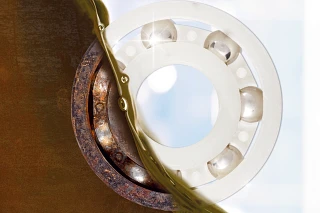
Ball bearings replace sliding friction with rolling friction, allowing rotational movement to take place with little resistance. As a rule, they must be lubricated in order to function properly. xiros plastic ball bearings require no additional lubrication, are corrosion-free and operate extremely quietly. This makes them a cost-effective alternative to their metal counterparts. The components, which consist of a tribopolymer mixture, are lightweight, resistant to chemicals and optionally non-magnetic. This ensures safe use in medicine, packaging, food and drive technology and many other industries.
Our xiros ball bearings consist of a mixture of basic plastics, solid lubricants, fibres and filaments. The balls used are usually made of stainless steel, glass or plastic. These are mounted in a cage, which can be made of our own xirodur materials, PA, PP or PEEK.
The advantages at a glance

Where can I buy ball bearings?
Radial deep groove ball bearings, thrust bearings, flanged ball bearings, pillow block ball bearings, ball transfer units, conveyor rollers, slewing ring ball bearings and other types in various sizes can be found in our online shop. Thanks to the wide range of materials, our solutions are designed for a wide variety of industries and can also implement your specific application.
Ball bearings made to measure
It cannot and does not always have to be the catalogue part. That's why we offer you the service option of requesting a customised special part that deviates from the DIN standard for your specific application. From the idea to the solution: Endless possibilities thanks to our polymer ball bearings. We will be happy to advise you.
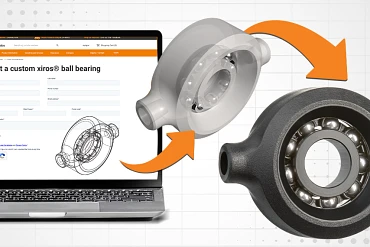
Materials and substances
Our materials are suitable for a wide range of applications and are characterised by a wide variety of advantages: From cost-effective all-rounders and heat specialists to chemical-resistant materials. Find out more about the ball materials used.
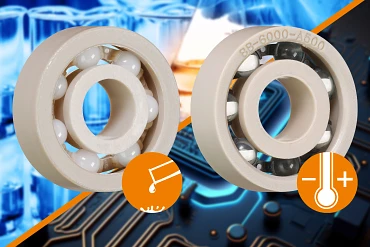
New products
We are constantly working on the further development of existing and new products to improve the technology of your application and reduce costs. We launch exciting polymer ball bearing products at every spring and autumn trade fair. Stay up to date at all times here.
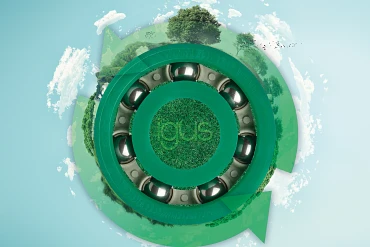
Where are ball bearings used? And what types are there?
It is impossible to imagine mechanical engineering without ball bearings. There are various designs, whereby the dimensions and technical composition of the components depend on the specifications of the industrial application. The most commonly used types are shown below.
Radial deep groove ball bearing according to DIN 625:
This type of ball bearing absorbs radial forces and is used wherever components rotate. In the automotive industry, for example, radial deep groove ball bearings can be found in the chassis, where the ball bearings are used to support and guide the axles. A radial force is always applied when the axle performs a rotary movement.
Angular contact ball bearing according to DIN 628:
This bearing is designed to absorb both radial and axial forces in one direction. Angular contact ball bearings make higher speeds possible and reduce friction for a wide range of loads. Angular contact ball bearings are used in the bicycle industry, the automotive sector or, for example, in lead screws on machine tools.
Self-aligning ball bearing according to DIN 630:
This type of ball bearing is generally used in applications with long shafts. This is due to assembly problems caused by holes in the housing. The axial force plays a role in self-aligning bearings. This must be kept low, as the grooves in the outer ring have limited contact surfaces for rolling elements. It is used in general mechanical engineering.
Thrust bearing according to DIN 711:
Also referred to as an axial deep groove ball bearing, this type is designed to support axial loads. They are available in a single-row or double-row design and are already used in numerous applications in the medical technology or packaging industry.
Here you can see where our polymer ball bearings are successfully used in industry.
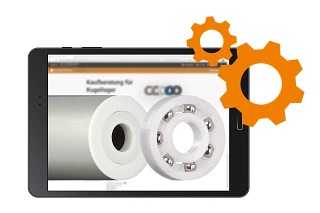
Technical information about ball bearings
In this section we answer some general questions about ball bearings and our polymer ball bearings. Among other things, the following topics await you:
- What is the structure?
- When should I change my ball bearing?
- Information and test reports from the test laboratory
- How do I mount ball bearings?
- White paper for download
Consulting
I look forward to answering your questions

Marcus Semsroth+49 2203 9649 7202Write e-mail
Shipping and consultation
In person:
Monday to Friday from 7 am - 8 pm.
Saturdays from 8 am- 12 pm.
Online:
24h
WhatsApp-Service:
Montag – Freitag: 8 – 16 Uhr








